macOS stack update policy
Xcode stack updates
You can select macOS stacks based on the Xcode version you need. Under the hood, one VM image contains multiple Xcode versions installed and your requested Xcode version is activated at runtime before your Workflow starts.
As a rule of thumb, Xcode minor versions of the same major version share the same VM image, but there might be exceptions based on compatibility issues and other considerations.
Versioning
When talking about versions, we use semver terminology, regardless of how the various tools define their versions.
Stacks have a lifecycle and have four different states: Edge, Stable, Frozen and Removed.
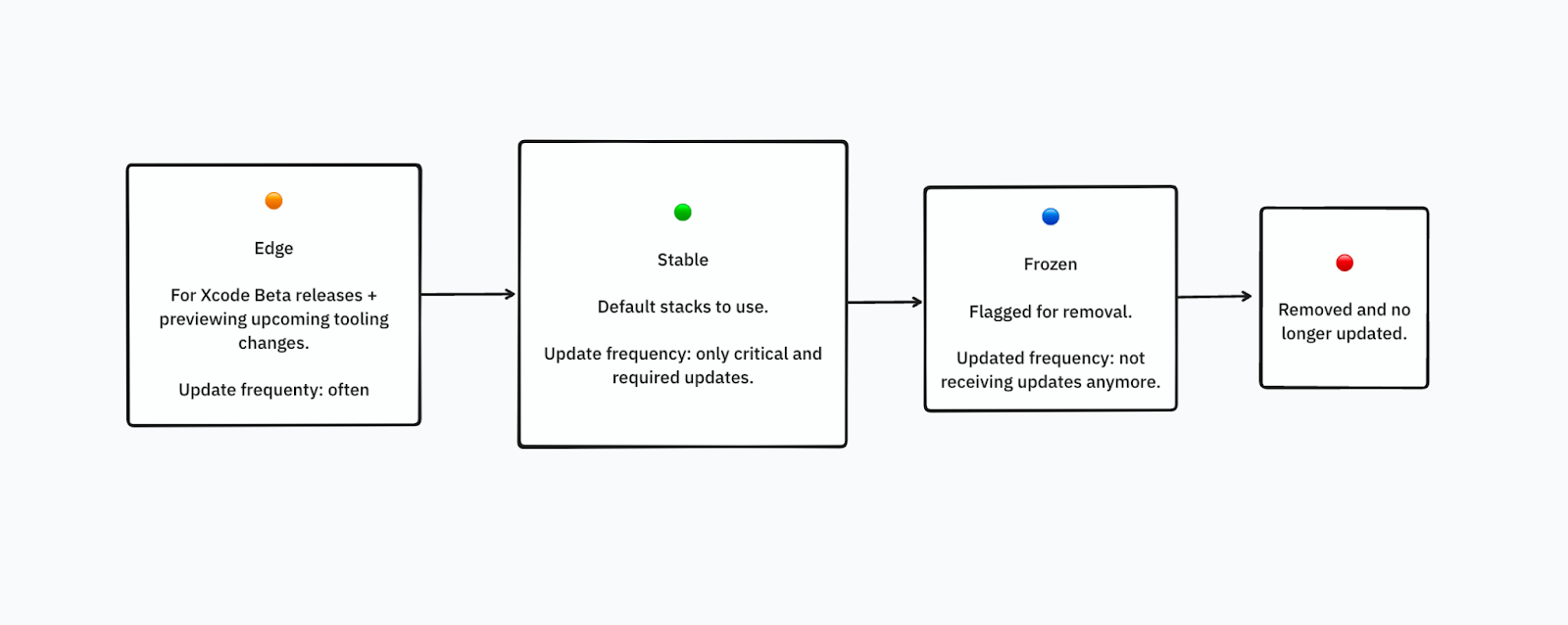
-
Edge: These stacks are for previewing upcoming versions and changes. They are updated in-place regularly, and they include the latest stable release of Xcode, the latest beta release of Xcode (if available) and the latest stable version of pre-installed tools. Regular weekly updates could add or remove tools, as well as upgrade the OS. Backwards compatibility for weekly updates is not guaranteed on an Edge stack. Run builds on Edge stacks to preview upcoming tool version changes (such as Ruby 3.2 becoming the default) and get access to the latest pre-release Xcode (such as Xcode 15 Beta).
-
Stable: These stacks are only updated with Xcode patch versions, and with critical security fixes. For maximum reliability and reproducible builds, we recommend pinning exact tool versions in Workflows instead of relying on the stack defaults (for example, pinning a Ruby version).
-
Frozen: These stacks are no longer updated and flagged for removal in accordance with the Stack deprecation and removal policy. The stack is still available for yourbuilds but you will see the final removal date on the UI. Preinstalled tools are not updated, so it’s your responsibility to keep up with bugfixes and security patches.
-
Removed: These stacks are no longer available to use.
State transitions for Xcode stacks
During the lifecycle of a stack it will transition between states when triggered by new Xcode and macOS releases. Stacks transition as follows:
-
Edge to Stable.
-
Stable to Frozen.
-
Frozen to Removed.
Edge stack updates
Edge stacks provide a way to preview and test upcoming changes. Xcode Beta versions become available as Edge stacks while final Xcode releases become available as new Stable stacks. Xcode Edge stacks change when:
-
The first Beta version of a new major Xcode version is released.
-
The first Beta version of a new minor Xcode version is released.
-
A new version of an Xcode Beta version is released.
When an Xcode minor version is released as a beta, it becomes available as an Edge stack. Other Edge stacks do not transition to Stable until the beta version in question is released as a GA version.
In this example:
-
The current latest Xcode version is 15.3.
-
A new Beta version of a new major Xcode version is released: Xcode 16.0 Beta 1.
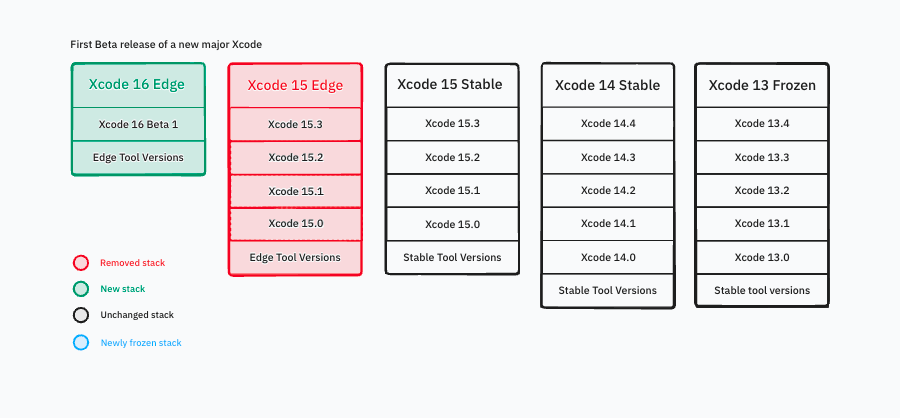
Once the new Beta version is released, we update our stacks:
-
The new Xcode release becomes available on Bitrise as an Edge stack. In our example, Xcode 16.0 Beta 1 becomes available as the Edge stack.
-
Current Edge stacks are phased out, and users are automatically migrated to the new Edge stack. This happens a few days after the new Xcode release. In this example, this means phasing out Xcode 15.x Edge stacks.
-
Stable stacks are not affected at this point.
In this example:
-
The current latest Xcode version is 15.2.
-
A new Beta version of a new minor Xcode version is released: Xcode 15.3 Beta 1.
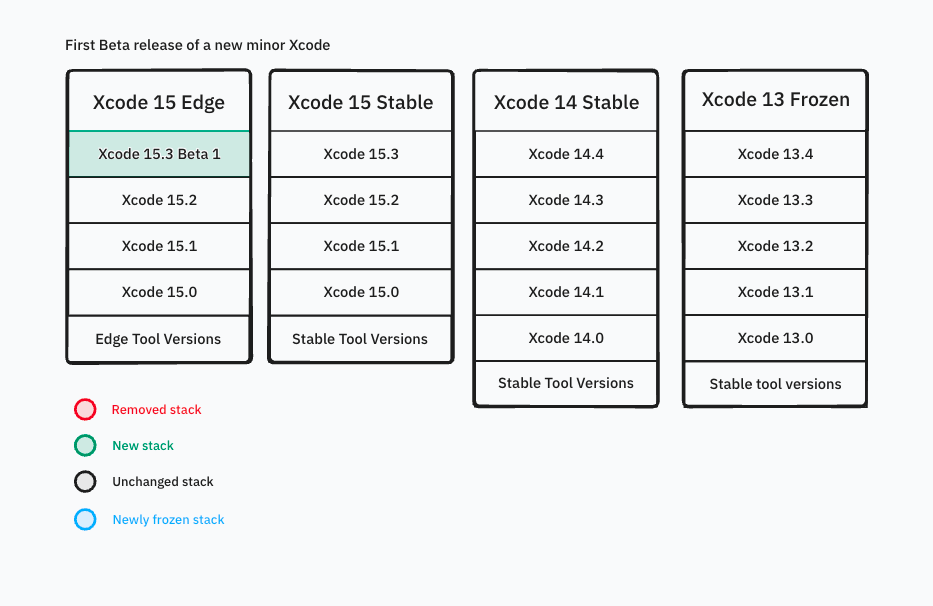
Once the new Beta version is released, we update our stacks:
-
The new Xcode release becomes available as an Edge stack. In this example, Xcode 15.3 Beta 1 becomes available as an Edge stack.
-
Stable stacks are not affected at this point.
In this example:
-
The current latest Xcode version is 16.0 Beta 1.
-
A new Beta version is released: 16.0 Beta 2.
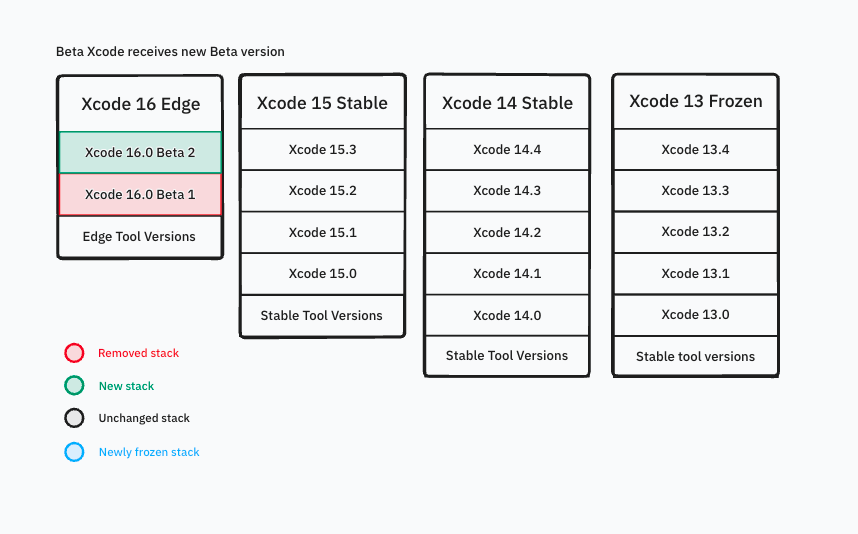
Once the new Beta version is released, we update our stacks:
-
Xcode 16.0 Beta 2 replaces 16.0 Beta 1 on the Xcode 16.0 Edge stack.
-
Stable stacks are not affected at this point.
Stable stack updates
Stable stacks change less often than Edge stacks as we want to avoid unexpected breaking changes on these stacks.
Existing Stable stacks change when:
-
A new major Xcode version is released.
-
A new minor Xcode version is released.
In this example:
-
The current latest Xcode version is 15.3.0.
-
A new major Xcode version is released: Xcode 16.0.
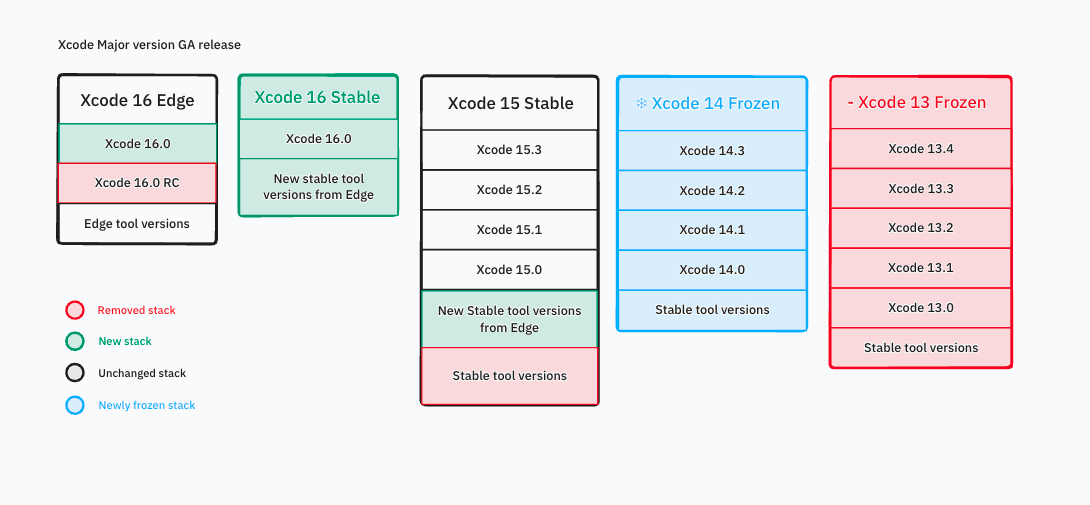
When the new major version is released, we update our stacks:
-
New Stable stack: Xcode 16.0 becomes available on Bitrise as a new Stable stack.
-
Oldest Stable stacks become Frozen. In this example, Xcode 14.x stacks become Frozen, but still available for building. Tool versions are not changing on these stacks: their latest state is frozen.
-
Old Frozen stacks are removed: in this example, Xcode 13.x stacks are removed. The remaining users are migrated to newer stacks.
In this example:
-
The current latest Xcode version is Xcode 15.2.
-
A new minor Xcode version is released: Xcode 15.3.
When the new minor version is released, we update our stacks:
-
New Stable stack: Xcode 15.3 becomes available on Bitrise as a Stable stack.
-
Xcode 15.3 Edge stack is updated with the final Xcode version.
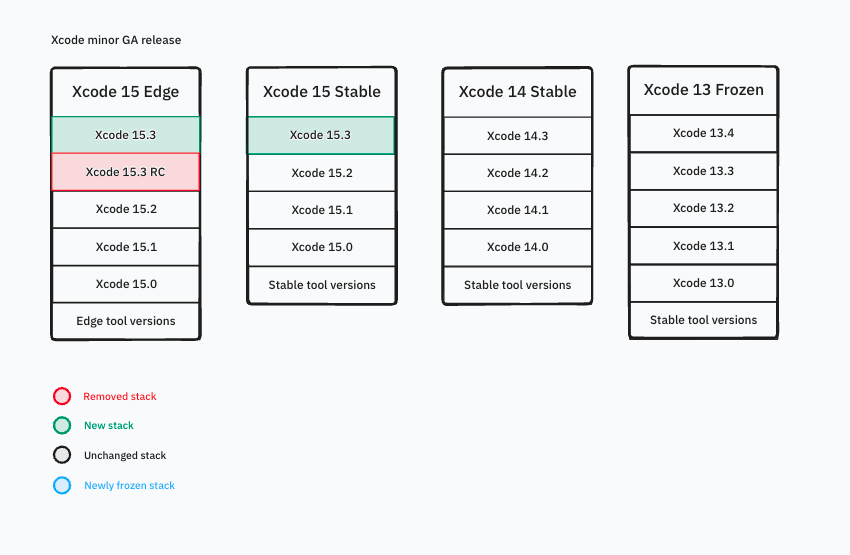
macOS releases
The exact macOS version is always highlighted on the stack report pages.
When a new major macOS version is released, we upgrade the Edge stacks to the new OS after an internal testing period.
As a general rule, we don’t upgrade macOS on Stable stacks to avoid unexpected build failures. We wait until a future Xcode release starts requiring the new OS version (for example, Xcode 15.0, 15.1 and 15.2 are compatible with macOS Ventura, but 15.3 requires Sonoma). Once this happens, the Stable stack variant of this Xcode version is based on the new major OS version, while older Stable Xcode stacks remain on the older OS version.
While the new major OS is not available as a Stable stack, we recommend testing it on one of the Edge stacks. We are looking for your feedback, including edge cases and performance regressions.
Events not triggering a state transition
Not all Xcode releases trigger a transition. For example, Xcode beta minor version releases do not trigger an Edge to Stable stack transition: the new beta version simply replaces the old one. Xcode patch releases do not trigger an Edge to Stable stack transition. Instead, the Stable stacks will be updated in place with the new patch version.
Simulator runtimes on Xcode stacks
You can find the list of preinstalled tools, including simulator runtimes on our stacks on the stack reports pages.
You can expect the following simulator runtimes to be installed:
-
The matching runtime versions of a given Xcode version: these are the iOS, watchOS, tvOS and visionOS runtime versions that Xcode prompts you to download at first launch.
-
For iOS, we also install two additional versions: the two previous major versions, of which the latest minor version is installed.
-
For watchOS, we also install the previous major release’s latest minor version.
For example, when selecting the Xcode 15.0 stack, you can expect:
-
iOS 17.0: the matching runtime of this Xcode.
-
iOS 16.4: the latest minor release of the previous major iOS version.
-
iOS 15.5: the latest minor release of the second-previous major iOS version.
-
watchOS 10.0: the matching runtime of this Xcode.
-
watchOS 9.4: the latest minor release of the previous major version.
-
tvOS 17.0: the matching runtime of this Xcode.
-
visionOS 1.0: the matching runtime of this Xcode
Changelog
June 2025
Changed
Mentions of Linux stack update policy has been moved on its own page, Linux stack update policy, with more information on Edge, Stable and Frozen stacks. It also describes the yearly cadence of new Linux stacks, as well as the deprecation and removal of older Linux stacks.
Removed how to use previous versions of a stack from this page and added it to Stack update policy.
July 2024
Removed:
Mentions of dependency manager cache updates. Both Cocoapods and Homebrew have better mechanisms now than cloning the entire registry git repo, and these newer mechanisms (Cocoapods CDN, Homebrew API) are enabled on stacks now. When stacks are updated, you can expect the on-disk repos to be up-to-date, but Stable stacks are no longer strictly updated weekly if there are no other changes to release.
Changed:
The breaking changes to stable macOS stacks (once a year when a new Xcode major version is released) no longer apply to older, existing stable stacks, only the newly released stable stack. For example, when Xcode 16.0 is released, the planned breaking changes only apply to the Xcode 16.0 stable stack. Xcode 14.x and 15.x stable stacks won’t receive breaking changes.
March 2024
New:
Define what happens when an Edge stack is phased out in favor of a newer edge stack.
Removed:
When a new Xcode Edge stack is released, it no longer brings tooling changes to the Stable stacks.
Changed:
New, simpler simulator runtime policy. The same number of older iOS major versions are installed, but only the latest minor version is installed for each.